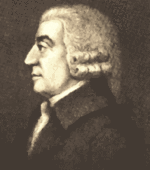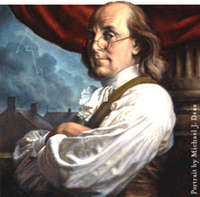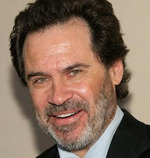Following is the essay you can designate as Volume 10, Number 39 of
This Week’s Clue, based on the e-mail newsletter I have produced since
March, 1997. It would be the issue of October 1.
Enjoy.
There is no more important liberal value than competition. Competition among businesses. Competition among ideas. Competition among institutions. Competition among nations.
The biggest lie told by conservatives over the last generation was that liberals did not believe in competition. You can hear this lie in all their rhetoric. They call liberals Communists or Socialists who seek to monopolize the economy on behalf of the state. Or they call liberals elitists who seek to monopolize ideas.
This lie has its roots in McCarthyism. It wasn’t just told by Joe McCarthy, but by Pat McCarran, by Walter Judd, most especially by the John Birch Society, which sought to make Mencken’s claim "when fascism comes to America it will be called Americanism" a literal truth.
Most of what is called libertarianism is in fact an attempt by the far right to create a vacuum which will enable their own monopoly on power. (I’ve studied Ron Paul for almost 40 years, and know whereof I speak.)
Competition has always worked, throughout history. Greece birthed
European civilization because of competition. Italy birthed the
Renaissance because of competition. Adam Smith was, in the context of
his time, a liberal, a "free-thinker," who wrote "The Wealth of
Nations" as an endorsement of Unitarians such as the entrepreneur
Josiah Wedgewood, a fierce competitor whose grandson (born after his
death) turned out to be Charles Darwin.
The scientific method is based on competition. It is liberal in
origin, and still considered liberal in today’s politics. The idea of
anti-trust law, the breaking of monopolies in order to maintain
competition, is also a liberal concept, brought forth by Republicans in
the 19th century, when the Republicans were the liberal party.
Competition is the magic word which, if used thematically,
can blow conservatism off the U.S. political map. Because everything in
the conservative record of this decade shows a deep hatred for
competition. And competition is also the central American idea.
The whole idea of monopolistic economic policies is to centralize
power and reduce competition. The whole idea of a unitary executive is
to centralize government power in one hand. The whole idea of secret
laws is to prevent contrary ideas from being heard.
The result is we are fighting ideas with armies, which can only
spread one idea at a time. When we should be fighting ideas with
questions, and demanding answers.
Until this decade that had been the American way. The Founders were
a highly diverse group of men — and women by the way. Some, like
Abigail Adams, were highly religious. Others, like Benjamin Franklin,
eschewed organized religion entirely. Abraham Lincoln, whose words
about God are among the most quoted in our lexicon, never had a home
congregation.
It’s not that these people, and so many others, were irreligious.
They were simply unwilling to surrender themselves to outside
authority. They weren’t atheists. They were Americans.
Every element remaining in today’s Republican party is
authoritarian. You’ve got your military authoritarians, your economic
authoritarians, you’ve got your religious authoritarians, and you’ve
got people who lie to themselves with impunity. That’s about it,
really. Everyone else in the party is suspect, by these same groups,
and rightly so.
It’s a tragedy, but one which has its roots deep in our history.
Many American colonies were founded under a banner of religious
tyranny. Many Americans actually feared that the Nazis, or the
Communists, might win because of their greater unity. Many Americans
actually felt that monopoly, the control of the economy in a few "sound
hands," was the only way to run things.
The fact is none of it works. Nations that endorse a specific
religion fail over time. Nations that preach a single ideology fail
over time. Nations that allow monopoly fail over time. They are
inflexible, they can’t adapt. Things change and they’re lost.
Only competition, free and open competition, can solve the
succession problem. Someone reaches the top of the mountain, whether an
academic mountain, a business mountain, a religious mountain, an
entertainment mountain, or a political mountain, and everything they
say looks right, sounds right, it seems to work. But only for a moment.
Without competition, the moment passes and their whole structure starts
to fail from the inside. With competition it is battered, forced to
change, and may actually survive. So we celebrate the moment because
you know that’s all there can ever be, in a world of continuous
competition.
That’s really what sport is all about. Every athlete grows old.
Every dynasty ends. Change is constant. That’s the lesson. It’s an
important lesson, a vital lesson, the only lesson it really teaches.
And it’s one liberals should be talking about, rather than letting
athletes sell the continuing delusion that obedience to conservative
authority, to any authority, will keep them forever young. Team sports
are based on obedience to authority, but no team is always successful.
For the last 40 years liberals have suffered a tactical problem.
They have allowed the Big Lie to be sold. They have allowed their own
disunity to be seen as a flaw, rather than celebrated as the free
competition it represents. And they have let Republican unity be seen
as a strength, rather than the authoritarian weakness it in fact is.
Now that you have spent these last few minutes listening to me
praise competition, and identify it with liberalism, let me tell you
the biggest problem with it.
It’s hard. People don’t like it. As individuals, we take one shot at
life, only one, and there’s no room in that life for wishy-washy
contention. Winners go for it.
People seldom change their minds. Generally what you believe at 20
is what you’ll believe at 60. It’s not true that young people are
liberal and old people are conservative. It takes an enormous effort of
will to change your beliefs.
That’s why the generational view of American politics, which I’ve
been writing about here for two years, works. The cycle here is the
life cycle. Whether or not you lived through the 1960s, your worldview
has been filtered through that prism. It was an enormously wrenching
crisis, which caused literally tens of millions of people to change
their entire worldview. They held that view, they taught it to their
children, and they practiced it for the rest of their lives.
Now we are in the midst of another crisis. This decade is a crisis
decade, bookended by the 9-11 attacks and the Iraq War. The first
caused many people to throw themselves across the political chessboard,
from left to right. Dennis Miller,
for instance, didn’t go from being a moderate liberal to a moderate
conservative. He went directly into foam-at-the-mouth authoritarian
lunacy. At the same time, John Dean didn’t
go from being a moderate conservative to a moderate liberal. He is now,
by all accounts, an activist liberal Democrat, where before this decade
he was an aggressive Republican stalwart.
What happened to them has also happened to us. A decade of crisis is
a period of wrenching political change. All changes in worldview are
wrenching. They are not moderate or modest. People went from faith in
FDR to stolid support for Nixonism 40 years ago. They are moving today
from the Nixon Thesis to something completely new.
There are liberals who don’t like this. There are liberals who see
their own worldview threatened by all these newbies. There are liberals
who see their own sinecures, their own beliefs, their own nests, as
inviolable. These are the successors to the Rockefeller Republicans of
the last generation, people who lean against the Nixon Thesis and take
its abuse because it’s the only life they know. Call them the whipped
dog caucus.
In a time of crisis, we must contend with both. We must contend with
those who cling to the old ways like barnacles do to a ship’s hull. We
have to physically scrape them from the hull of our economic,
political, and media systems. We do this by creating new structures,
new types of media, new political organizations, and new intellectual
infrastructure, as the great liberal Thomas Jefferson wrote:
That whenever any Form of Government becomes destructive of these ends,
it is the Right of the People to alter or to abolish it, and to
institute new Government, laying its foundation on such principles and
organizing its powers in such form, as to them shall seem most likely
to effect their Safety and Happiness.
The
pessimist in Jefferson saw the Constitution as temporary. He believed
that new revolutions would be needed, periodically, in order for
society to grow. What he didn’t understand is that the roots of such
revolutions were contained in the document. We can have a national
revolution every two years, or every four, or every eight. We can have
it in our cities, in our states, or in our nation. That power is always
within our hands. We just don’t use it often.
Competition is hard. Competition creates losers, and an obligation
to deal with the result of loss. But competition was, is, and will
remain the key liberal value, and it is the magic word that can lead
liberals to power, in 2008 and beyond.


















“Most of what is called libertarianism is in fact an attempt by the far right to create a vacuum which will enable their own monopoly on power. (I’ve studied Ron Paul for almost 40 years, and know whereof I speak.)”
This is unfair. The vast majority of libertarians would be quite comfortable in coalition with liberals who held competition as a core value. The problem is that the Southern Strategy has slowly reduced all “respectable libertarianism” within the GOP into pro-corporate and pro-war shilling.
Since you mention Paul, I would argue that Ron Paul would be a good analogy to George Wallace (better than Bloomberg for certain). He represents a significant portion of the public that presently won’t vote Democratic, but that could easily be brought into the Democratic fold.
“Most of what is called libertarianism is in fact an attempt by the far right to create a vacuum which will enable their own monopoly on power. (I’ve studied Ron Paul for almost 40 years, and know whereof I speak.)”
This is unfair. The vast majority of libertarians would be quite comfortable in coalition with liberals who held competition as a core value. The problem is that the Southern Strategy has slowly reduced all “respectable libertarianism” within the GOP into pro-corporate and pro-war shilling.
Since you mention Paul, I would argue that Ron Paul would be a good analogy to George Wallace (better than Bloomberg for certain). He represents a significant portion of the public that presently won’t vote Democratic, but that could easily be brought into the Democratic fold.
AT&T new’s terms of service apparently allow them to refuse you service if you criticize them. Yeah, that’s competitive…
http://yro.slashdot.org/article.pl?sid=07/09/29/104252
AT&T new’s terms of service apparently allow them to refuse you service if you criticize them. Yeah, that’s competitive…
http://yro.slashdot.org/article.pl?sid=07/09/29/104252